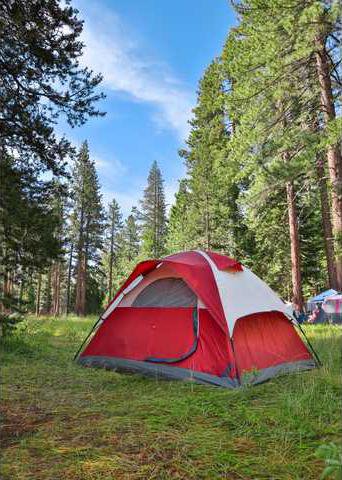With the summer months in full swing, a lot of families are headed to the mountains to go camping. Camping is a great way to connect with nature and bond with family, but it can also be challenging planning your meals to be nutritious.
Whether you are headed to a family reunion or are planning a camping trip just for yourself, here are four tips that can help you stay healthy while planning your meals:
1. Include fiber
Sometimes the foods that are the most commonly promoted as camping foods such as chips, processed meats, or campfire treats contain very little fiber. Camping in the woods, especially if there are no flushable toilets, may be one of the most undesirable places to be constipated. When planning meals and snacks for your trip, try to include foods that are a good source of fiber such as fruits, vegetables and whole grains. Dried fruit can be easily portable and is also a great source of fiber.
2. Make meals ahead of time
Camping often limits access to cooking supplies, utensils and heat sources. Preparing meals ahead of time will not only save you precious vacation time, but it can be a great way to make sure you are including nutrient dense foods.
There are a lot of great recipes that can be prepared, or possibly even cooked, ahead of time that are perfect for traveling. Your diet doesn't have to go out the door because you aren't in the kitchen. Try to include foods from all the food groups in each meal including fruits, vegetables, grains, dairy and protein. Remember, if an item is perishable, use a reliable cooler or fridge.
3. Be aware of snack calorie content
Trail mix, nuts and dried fruit are very common snacks to pack for a hike or camping trip; these can be a great source of protein and fat. However, consumers are sometimes unaware of either calorie content or serving size. For example, a one ounce serving of nuts, just a casual handful, can range from 160-200 calories. All foods can be fit into any healthy diet. Still, being aware of what you are putting into your body and the realistic calorie content of those foods can help alleviate some of the common overconsumption of empty calories, which provide no nutritional value.
4. Stay hydrated
Camping or not, it is essential to keep your body hydrated during these hot summer month. Staying hydrated can help curb your hunger in between meals and help your body function properly, especially in high temperatures. Water can be considered the best source of hydration for your body. Sodas, sports drinks and other high-sugar drinks may provide hydration, but often provide unnecessary calories with little nutrition.
Don't throw your eating habits out the door when planning a camping trip. There are a lot of nutritious meals and snacks that can help make your vacation enjoyable and healthy. By planning your meals ahead of time and being aware of the nutritional value of foods, you can stay healthy and happy this camping season.
Whether you are headed to a family reunion or are planning a camping trip just for yourself, here are four tips that can help you stay healthy while planning your meals:
1. Include fiber
Sometimes the foods that are the most commonly promoted as camping foods such as chips, processed meats, or campfire treats contain very little fiber. Camping in the woods, especially if there are no flushable toilets, may be one of the most undesirable places to be constipated. When planning meals and snacks for your trip, try to include foods that are a good source of fiber such as fruits, vegetables and whole grains. Dried fruit can be easily portable and is also a great source of fiber.
2. Make meals ahead of time
Camping often limits access to cooking supplies, utensils and heat sources. Preparing meals ahead of time will not only save you precious vacation time, but it can be a great way to make sure you are including nutrient dense foods.
There are a lot of great recipes that can be prepared, or possibly even cooked, ahead of time that are perfect for traveling. Your diet doesn't have to go out the door because you aren't in the kitchen. Try to include foods from all the food groups in each meal including fruits, vegetables, grains, dairy and protein. Remember, if an item is perishable, use a reliable cooler or fridge.
3. Be aware of snack calorie content
Trail mix, nuts and dried fruit are very common snacks to pack for a hike or camping trip; these can be a great source of protein and fat. However, consumers are sometimes unaware of either calorie content or serving size. For example, a one ounce serving of nuts, just a casual handful, can range from 160-200 calories. All foods can be fit into any healthy diet. Still, being aware of what you are putting into your body and the realistic calorie content of those foods can help alleviate some of the common overconsumption of empty calories, which provide no nutritional value.
4. Stay hydrated
Camping or not, it is essential to keep your body hydrated during these hot summer month. Staying hydrated can help curb your hunger in between meals and help your body function properly, especially in high temperatures. Water can be considered the best source of hydration for your body. Sodas, sports drinks and other high-sugar drinks may provide hydration, but often provide unnecessary calories with little nutrition.
Don't throw your eating habits out the door when planning a camping trip. There are a lot of nutritious meals and snacks that can help make your vacation enjoyable and healthy. By planning your meals ahead of time and being aware of the nutritional value of foods, you can stay healthy and happy this camping season.

